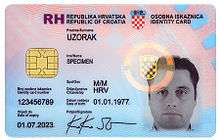Croatian identity card
| Croatian identity card (Osobna iskaznica) | |
|---|---|
 | |
 | |
| Issued by |
|
| Valid in |
|
| Type of document |
Identity card, optional replacement for passport in the listed countries |
| Eligibility requirements | Croatian citizenship |
Croatian identity card (Croatian: Osobna iskaznica) is an identity document issued in Croatia. Any Croatian citizen who is resident in Croatia can obtain an ID card and it is compulsory for all citizens over the age of 16. This document is issued by the police on behalf of the Ministry of the Interior.[1]
Both the 2003 and the 2013 version of the ID card are valid as travel documents in most of Europe. The pre-2003 version is valid only in Croatia.
History
SR Croatia had identity cards during the time SFR Yugoslavia since 1974.[2] When the country became independent, a new identity card replaced the old one with a two-year transition period.[3]
Physical appearance
Similarly to a credit card, the identity card is plastic and rectangular in shape, 86 × 54 millimeters in size.
2003 version

On the left side is a hologram, on the right side is the photograph of the bearer. On the top edge of the card, the name of Republic of Croatia available in two languages, Croatian and English (REPUBLIKA HRVATSKA / REPUBLIC OF CROATIA), below the name of the card is available in the same two languages (OSOBNA ISKAZNICA / IDENTITY CARD).
The descriptions of the fields are printed in Croatian and English.
|
|
2013 version
The 2013 version has been redesigned to be compatible for the installation of an Electronic identity card chip. Issuing of electronic ID cards began in 2015. In addition to all data on the 2003 version, the back side of the new ID card also features the Personal identification number (OIB).
Fines
Persons over the age of 18, and who do not have a valid ID, can pay a fine from 1,500 up to 2,500 kn. Failure to show a valid ID to a police officer in a public place can result in a fine of 100 kn.[1]
International travel
Since Croatia's accession to the EU, in accordance with the Treaty of Accession 2011, on 1 July 2013 the Croatian identity card (except for the pre-2003 version) became a valid travel document within the entire EEA. Croatia finished negotiating their accession to the European Economic Area in November 2013.
Today, the card is a valid travel document in almost all of Europe (except Belarus, Kosovo, Russia, Ukraine and Turkey) as well as in Georgia and French overseas territories with direct flights from Europe. Since July 2015, the card is also valid in Morocco if travelling on an organized tour. [4][5][6][7][8][9]
See also
- Croatian passport
- National identity cards in the European Economic Area
- List of identity card policies by country
References
- 1 2 Zakon o osobnoj iskaznici (Croatian)
- ↑ "Zakon o osobnoj karti", Narodne novine, issue 54, 1974.
- ↑ "Zakon o osobnoj iskaznici", Narodne novine, issue 53, 1991.
- ↑ Albania: visa and passport requirements
- ↑
- ↑
- ↑ EU residents will need only ID to enter Macedonia
- ↑ Montenegro: visa and passport requirements
- ↑ EU citizens can enter Serbia without passport
External links
- Basic information about Croatian ID (Croatian)
- Picture of the ID
- Notification from Croatian Ministry of the Interior (Croatian)